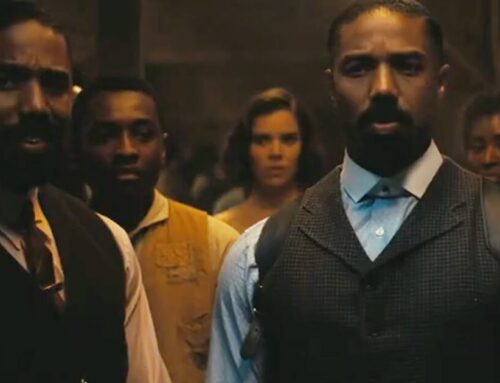It’s the only number to be retired by all of baseball and belonged to the tough, multi-talented athlete Jackie Robinson who rose out of poverty in rural Georgia to break baseball’s color barrier when he signed with the Brooklyn Dodgers in 1947. Written and directed by Brian Helgeland (L.A. Confidential, Mystic River), “42” is a straight ahead, corny, rousing triumph of a biopic–just the way I like ’em– featuring a sharp, charismatic star turn by Chadwick Boseman. It’s hard to imagine anyone else in the part except maybe Jackie Robinson who played himself in the 1950 film “The Jackie Robinson Story.”
A degree from the British American Dramatic Academy in Oxford, England– and copious episodic US TV credits– must have left this actor aching for exercise. Boseman practically explodes off the big screen, nailing Robinson’s lean athleticism and steely character. The film makes clear the personal grit this trail blazer required beyond the necessary physical skills. Robinson who also excelled in football, track, and basketball, suffered the slings and arrows of outrageous misfortune at the hands of fans, teammates, and opponents alike. A relentless barrage of verbal slurs, withering public derision, and countless death threats to him and his family would have flattened a lesser man. Boseman’s Robinson plays through the fire and emerges stronger than before.
Harrison Ford’s initially indigestible performance as the man who hired him– Dodgers President Branch Rickey–is equal parts ham and sanctimony. The performance doesn’t settle down until a quiet moment off the field when Ford’s Rickey reins it in, stops talking, and gently comforts the weeping player. Subtlety isn’t the film’s strong suit. Assorted little boys, black and white, are used to make a point about the influence adults have on on how kids see the world. Heavy handed lines like, “You will remember me” and “He’s comin,’ ” are repeated, chant-like, threatening to sink a story that’s strong enough on its own.
But there is one scene near the end of the movie that benefits from the four-square delivery, that true, legendary moment when Dodgers team captain Pee Wee Reese walks up to Jackie in the middle of a jeering stadium and puts his arm around Jackie’s shoulders signaling an imprimatur and a sea change in the American public’s feelings about a black man in a white uniform. The scene is the emotional climax of the movie.
As the rest of the film propels itself to summation with a slow mo run around the bases and home, an ending that feels anticlimactic…it is simply clear that Robinson’s triumphs on the field had less to do with his physical talent than his extraordinary personal stamina. Corny as that sounds– it really happened. And the rest is history.






[…] you don’t have time to read the FULL TEXT REVIEW of “42”– check out my :30 Second Review with video for a short, smart critical assessment of […]